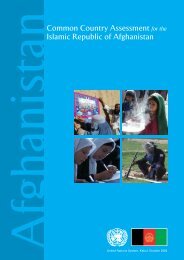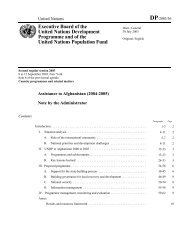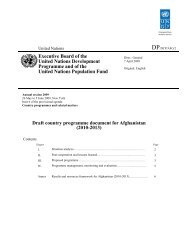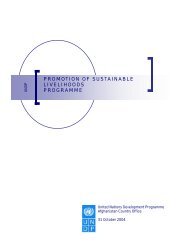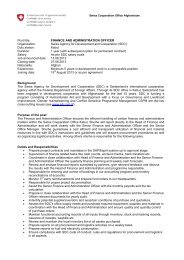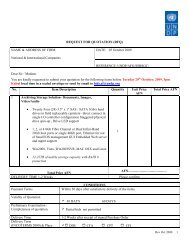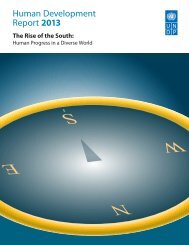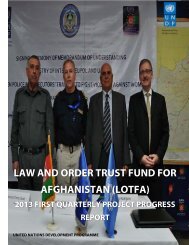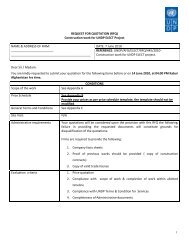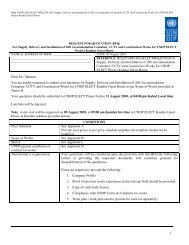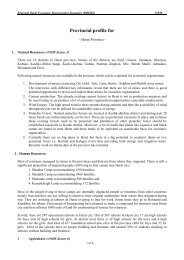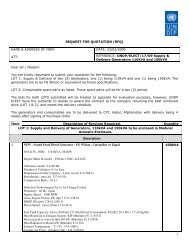GENDER EQUALITY PROJECT - UNDP Afghanistan
GENDER EQUALITY PROJECT - UNDP Afghanistan
GENDER EQUALITY PROJECT - UNDP Afghanistan
Create successful ePaper yourself
Turn your PDF publications into a flip-book with our unique Google optimized e-Paper software.
EXECUTIVE SUMMARY<br />
The Gender Equality Project (GEP) aims to establish models in cooperation, coordination and<br />
public sector effectiveness for gender mainstreaming, promotion of gender equality and<br />
strengthening of the position of women, with selected key government and non-government<br />
partners. In order to achieve this, the project has two outputs of: strengthening the capacity of the<br />
WA) as a policy making and oversight body for an effective<br />
implementation of the National Action Plan for Women of <strong>Afghanistan</strong> (NAPWA) and<br />
strengthening the capacity of sub-national institutions with the establishment of Provincial<br />
-economic empowerment of women.<br />
In Q2, progress under Output 1 included improving the capacity of MoWA for the collection of<br />
gender-disaggregated data for the implementation of the NAPWA indicators and also facilitate the<br />
integration of gender sensitive components into the policies and programmes of line ministries<br />
(LMs), institutionalizing a networking mechanism within MoWA for the collection and<br />
dissemination of gender specific information, and the review of three LMs and two independent<br />
organizations.<br />
The Monitoring and Evaluation (M&E) mechanism was revised and submitted for the final approval<br />
before being implemented. In addition, support was provided to the other LMs which included the<br />
review of budget making documents of the Budget Directorate in the Ministry of Finance (MoF) for<br />
integrating gender in the preparation of budgets of the seven pilot ministries, development of<br />
capacity development of female extension staff at the Ministry of Agriculture, Irrigation and<br />
Livestock (MAIL), closer coordination with the Ministry of Hajj and Religious Affairs (MoHRA) for<br />
collaborating with religious leaders on gender sensitive issues, provision of guidance for the<br />
preparation of the gender policy of the MoHE among others. The training of Capacity<br />
Development Officers of the <strong>UNDP</strong> National Institutional Building (NIBP) and the officials of the<br />
Ministry of Interior (MoI) in collaboration with the <strong>UNDP</strong> Law and Order Trust Fund for <strong>Afghanistan</strong><br />
(LOTFA) project enriched the outputs of the Gender Cluster through GEP. As a result of these two<br />
interventions, both the projects have integrated gender as a main outcome of their different<br />
initiatives<br />
For Output 2, at the sub-national level, the GEP enhanced the capacity of the members of<br />
elopment Councils (PWDC) in four provinces (Bamyan, Balkh, Herat and<br />
Nangarhar) through its provincial offices in order to improve their service delivery for the socioeconomic<br />
empowerment of women. Other initiatives to support the rural women included<br />
improving the service delivery of the Legal Help Centres (LHC) and completing preparatory<br />
activities for the establishment of the toll-free hotline in the three remaining provinces to assist<br />
vulnerable women in accessing the justice system. In addition, GEP employed innovations<br />
interventions for sensitizing the religious leaders to improve their understanding about the role<br />
and status of women in society. Moreover, trainings for local media personnel to improve the<br />
quality of reporting on gender specific issues were also organized.<br />
Despite the achievements listed above, there were some challenges which impacted on the<br />
se were within the management of the project office<br />
and measures to address them were undertaken in order to continue with the activities.<br />
H<br />
ce and<br />
required close consultations with other development partners to ensure the delivery of those<br />
specific interventions were achieved with minimal delays.<br />
Despite these risks and issues, GEP is committed to its goals and will continue its work in<br />
overcoming deep-rooted gender inequalities in <strong>Afghanistan</strong> through partnerships with MoWA,<br />
civil society organizations, and Afghan women and communities.<br />
1 | P a g e



